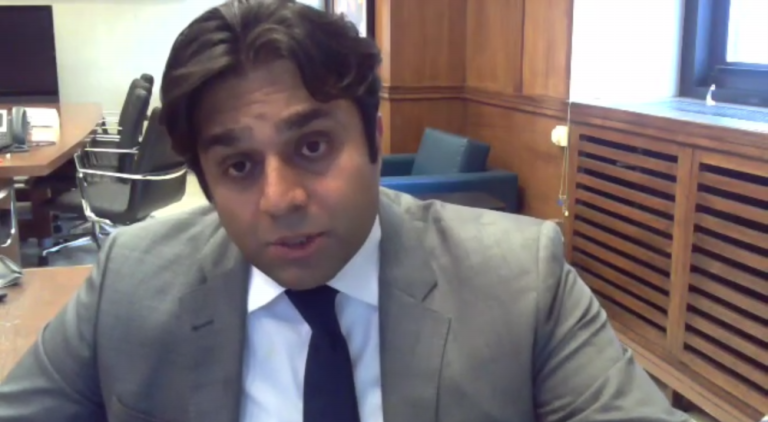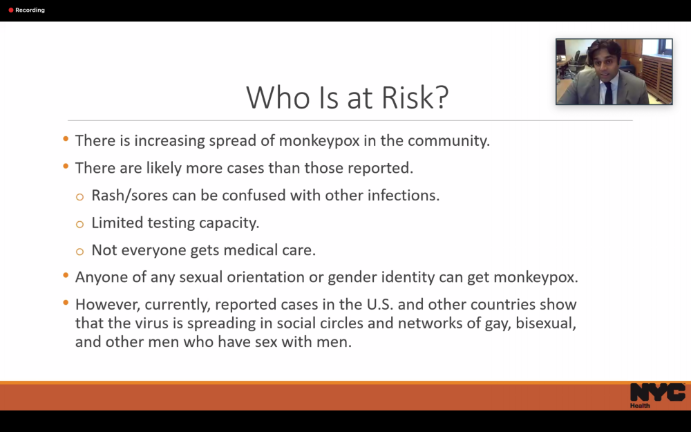Monkeypox Is Here
It’s usually a self-limiting disease. But vaccination efforts have been fraught with glitches and shortages — and there are still some scientific unknowns


Hundreds in New York City have now likely come down with a fever and body aches not caused by COVID-19. They may have suffered fatigue and swollen lymph nodes. Characteristically, they’ve developed uncomfortable — even brutally painful — rashes, with pus-filled sores on some of the most sensitive parts of their bodies.
Monkeypox, once a disease geographically bound to West Africa (at least in the case of this particular strain, and excluding cases borne from travel), has made its arrival known.
New Yorkers are feeling “a mix of fear, frustration and anger,” Council Member Erik Bottcher said, especially when it feels like the U.S. has been “caught unprepared” for the second time, two years after COVID-19 shut downs.
But despite any newfound familiarity with sudden and sweeping health crises, the city’s response to vaccinate at-risk New Yorkers has been fraught with challenges, from tech glitches to supply shortages. And there’s still a lot to learn about the virus — which has, in New York, spread predominantly among men who have sex with men.
The Problems
Bottcher, who represents the historically-LGBTQ+ neighborhoods of Hell’s Kitchen, Chelsea and Greenwich Village, was quick to start sharing information about monkeypox on social media after community members began falling ill. Many of his posts on Instagram and Twitter have conveyed updates on the availability of vaccine appointments — and on the status of the vaccine appointment website itself. “Aaaand the website crashes immediately,” Bottcher shared on Instagram on July 12, when a new round of vaccines became available. Earlier rounds had similarly caused the NYC Department of Health’s monkeypox vaccine portal to experience “technical difficulties.”
“People expect that when their government tells them to log into a website at a certain time, that it’s going to work,” Bottcher told Our Town. “And when it doesn’t work, it undermines their faith in the system.”
The underlying issue, and perhaps the more critical one, is the supply of vaccine doses, which has been limited thus far. As of Wednesday, July 20, NYC recorded 711 cases of monkeypox, up from 461 reported the prior Friday. It’s enough to account for around 30 percent of cases across the entire country — and yet the city has only received just under 22,000 doses as of July 18, as detailed in a letter from the five Borough Presidents, including Manhattan’s Mark Levine, to the Centers for Disease Control and Prevention (CDC).
It’s nowhere near enough, according to Dr. Ashwin Vasan, commissioner of the city’s Department of Health and Mental Hygiene (DOHMH). “Vaccine supply is extraordinarily low nationwide,” he said during a Monday town hall. “It’s low here in NYC and it’s much lower than our proportion of the cases that we make up in the country.”
“The vaccines exist, but they’re not where they should be, which is here in the United States and in people’s arms,” Bottcher said. Roughly 780,000 doses of the monkeypox vaccine have been stockpiled in Denmark at a facility recently inspected by the Food and Drug Administration, the Washington Post reported.
Meanwhile, the City Council’s LGBTQIA+ Caucus wrote to the CDC, calling for “much more support” and pointing out the present dearth of vaccines, as did the Borough Presidents, stressing that New York City has quickly become the “epicenter of this outbreak.” Levine has also proposed increased testing capacity and access to the antiviral drug tecovirimat, along with an online portal through which New Yorkers could pre-register for vaccine appointments. “The window for containing the spread of monkeypox in NYC is closing fast,” he tweeted.
A few days prior to the Borough Presidents’ letter, Mayor Eric Adams called upon aid from the U.S. Department of Health and Human Services.
Council Member Lynn Schulman, also an LGBTQ+ activist and chair of the Committee on Health, expressed frustration that monkeypox still isn’t being treated as a real threat. During the H.I.V./AIDS crisis, she “witnessed friends and neighbors die needlessly because of the indifference of those in power,” she said at the town hall. “I saw that same indifference with COVID, and now with monkeypox.”
The Science
A number of monkeypox’s qualities are known: It’s transmitted via direct contact with pustules on an infected person’s skin, with contaminated surfaces and by large respiratory droplets, Vasan explained. In this outbreak, lesions are commonly presenting on and around infected people’s genitals. Anyone can contract it and symptoms generally last two to four weeks, though aren’t typically so severe that they necessitate hospitalization.
“Is this a fatal disease? Usually not,” Vasan said.
But it’s “a rare disease that has now appeared on our shores,” he added — and science has some catching up to do. “Most of the data we have on monkeypox is based on decades-old studies,” he said.
It’s not yet definitively known, Vasan offered as an example, whether monkeypox can be spread via saliva, semen or vaginal fluid. It’s also unclear if people can spread the illness once they’ve contracted it, but before becoming symptomatic.
A two-dose regimen of the vaccine, made by Bavarian Nordic and called JYNNEOS, was proven in clinical trials to be 85 percent effective, according to Vasan. He said the city’s current approach of focusing on first doses, which go “a significant way towards that 85 percent,” is a prudent one, advising that people who feel sick or have symptoms to avoid clubs, parties or other gatherings and abstain from close contact and sex.
Those who are eligible for vaccination, Vasan explained, are “gay, bisexual or other men who have sex with men, or other transgender, gender non-confirming or gender non-binary people” 18 or older and who have had “multiple or anonymous sex partners in the last 14 days.” At the time of publication, no vaccine appointments were available.
The Messaging
The DOHMH has been running advertisements to get the word out and, with the City Council and the Department of Nightlife, planned for a “night of action” on Friday, July 22, to spread information at bars and restaurants.
Destigmatizing is a big part of the messaging, Vasan said. “In this outbreak, it happens to be concentrated in the gay community, and specifically men who have sex with men,” he explained. “And that has to do with social networks, sexual networks. This is less to do about identity than it is about actions and behaviors.” It’s an intentional departure from the public health response in the early days of the H.I.V./AIDS epidemic, though it’s been a cause for conflict within the city’s health department, with some arguing that a stricter approach — “encouraging gay men to temporarily change their sexual behavior” — would better contain the spread, the New York Times reported.
“It’s important that we destigmatize this,” Vasan said at the Monday night town hall. “We don’t want to repeat the mistakes of the past, in ascribing the transmission of an infectious disease — which doesn’t care about your identity or care about who you are — to a particular group or a particular demographic of people.”
“Vaccine supply is extraordinarily low nationwide. It’s low here in NYC and it’s much lower than our proportion of the cases that we make up in the country.” Dr. Ashwin Vasan